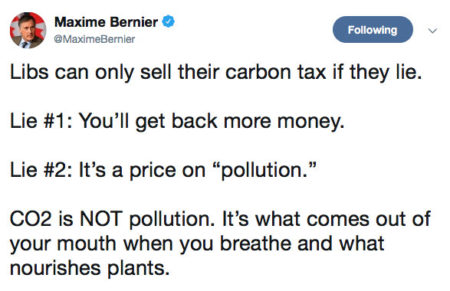August 19, 2019 – Is the changing climate the prevailing issue that will determine which political party forms Canada’s next federal Parliament? If not at the top, it is certainly top-of-mind in many households across the country. One of the reasons for this is the current Liberal government’s imposition of a carbon price on provinces that have not implemented carbon reduction strategies that meet the federal litmus test. The country appears to be divided into blocks. The eastern half sees climate change and the environment in its top three issues. The prairie provinces see federal overreach through carbon pricing and healthcare as two of the top three. The west coast has a similar inclination to the eastern half of the country. While the north, which is feeling the impact of a rapidly changing climate, is calling for immediate mitigation and adaptation policies and strategies.
Canada is a multi-party state dominated by Liberals, Conservatives, New Democrats (Canada’s social democratic party), and a nascent Green Party. In the last federal election, the Liberals won a majority of parliamentary seats and initiated environmental policies that have culminated with putting a price on carbon pollution. It is part of a much longer-term strategy to combat what the government now calls a climate crisis as opposed to climate change.
A splinter group of the Conservatives recently formed called the People’s Party of Canada whose leader, Maxime Bernier, denies that human activity has anything to do with observed changes to the global climate. He recently stated, “there is no climate change urgency in this country.” He argues that carbon dioxide (CO2) is not a pollutant spouting the same messaging that is the climate-change-denying nonsense of the American Heartland Institute, established by people like the billionaire Koch brothers, and American fossil fuel companies like Chevron, and Exxon-Mobil.
The People’s Party messaging nonsense made headlines today in The Globe and Mail, a national daily newspaper. Why? Not because of the nonsense being spouted, but because in the run-up to the election, a spokesperson for Elections Canada, the body responsible for overseeing the federal vote, has warned environmental charities about publishing information on the dangers of climate change during the election period which will probably begin in less than a month. What the charities are being told is that any messaging in the form of advertising, surveys, or published commentary on climate change that involves the spending of $500 or more, will require them to register as a third party and be subject to a new series of regulations, which could conceivably impact their charitable tax status. The point of contention is “issue advertising” involving the creation of “a message to the public during an election period that takes a position on an issue with which a candidate or registered party is associated.”
Tim Gray, Executive Director, Environmental Defence, is quoted in The Globe stating, “Obviously, climate change is real. Almost every credible institution on the planet is telling us to get our act together and do something about it.” Describing climate change as an issue rather than a “basic fact” makes Elections Canada look like it is the partisan on this issue, not Environmental Defence, or anyone else who speaks out against Bernier’s nonsense.
Gray points out the work being done by the United Nations and the Intergovernmental Panel on Climate Change (IPCC) which has produced reports compiled from peer-reviewed research and overseen by hundreds of eminent scientists from across the world. What it concludes is irrefutable – that human activity is correlated directly with planetary-wide changes to the global climate, and that these changes are being reinforced by positive feedback loops accelerating atmospheric temperature rise, continental and alpine glacier melt, a growing freshwater crisis, ocean level rise and increased acidity, changes to disease vectors, and more occurrences of extreme weather.
Environmental Defence is an advocacy group that works with government, industry, and individuals to ensure Canada’s environment is safe, and healthy for all. It relies on an advisory group of accredited academics and professionals with expertise in a number of areas including toxic ingredients in consumer products and the environment, clean energy and climate change, water quality and freshwater conservation, and land use planning and natural areas conservation.
And here’s the rub that Elections Canada appears to have thrown into the next federal vote. If an accredited spokesperson from Environmental Defence refutes “facts” presented by a People’s Party candidate about anthropogenic climate change and does it through the spreading of information on social media, advertising, or other publications costing $500 or more, then telling the truth, would be deemed “partisan” and “illegal.” At least by Elections Canada’s interpretation.
Calling climate change opinion rather than fact has to be one of the dumbest things I have ever heard. What Elections Canada is, in fact, doing, is validating the nonsense of a party, whose leader is in climate-change denial. If you are still on the fence about this see below the party leaders own words on Twitter in reaction to the recent implementation of a price on carbon pollution.









